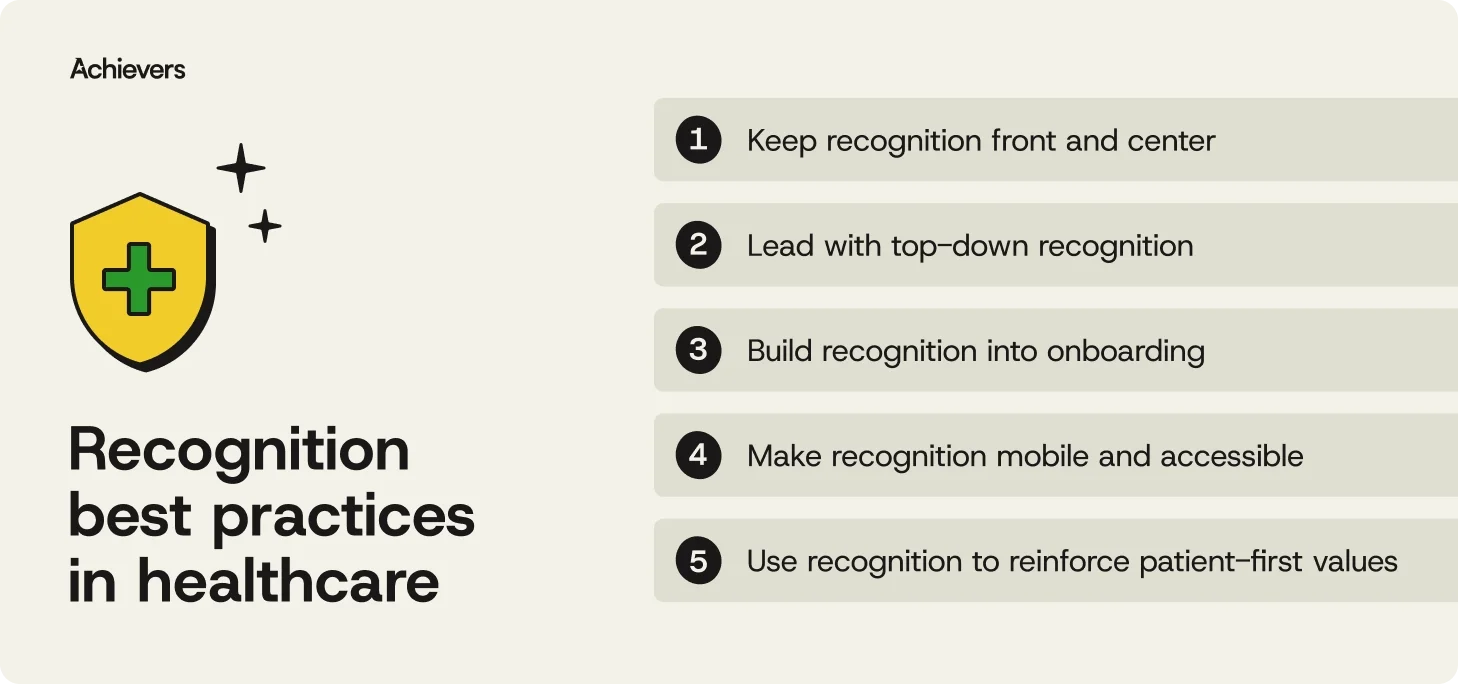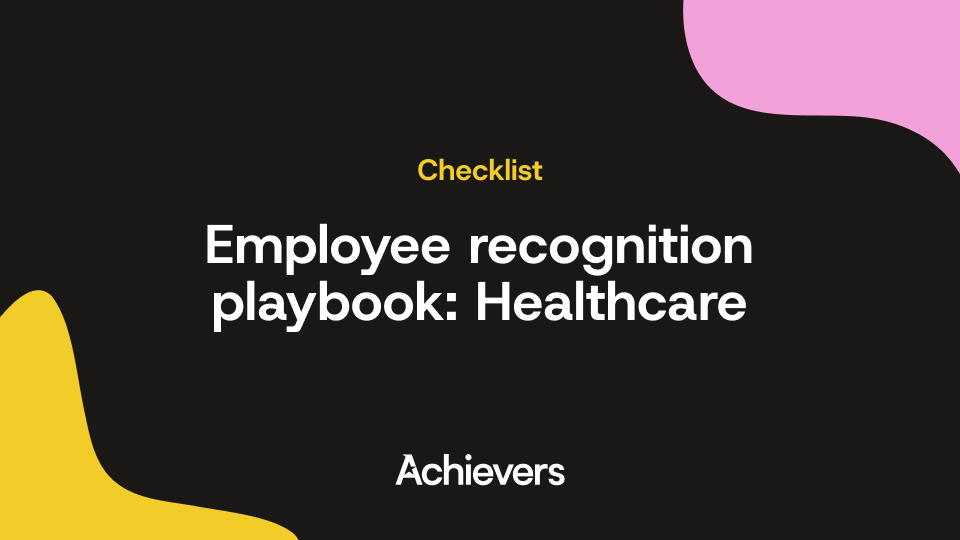Table of contents
Create a culture that means business™
Schedule a demo with an Achievers solution expert today.
Employee recognition in the healthcare industry isn’t just a “nice thing to do” — it’s survival fuel. Burnout is high, retention is low, and only 18% of employees feel meaningfully recognized, according to the Achievers Workforce Institute (AWI). When you’re working 12-hour shifts, juggling patients, paperwork, and the occasional emergency, feeling invisible isn’t just demotivating — it’s unsustainable.
Recognition, done right, can flip the script. It’s the difference between a workforce running on fumes and one fueled by purpose, connection, and the occasional well-earned “thank you” that actually means something.
So how do you turn recognition from a checkbox into something that genuinely moves the needle for healthcare teams? It starts with knowing what works — and what doesn’t — in a fast-paced, high-pressure environment.
Recognition best practices in the healthcare industry
Recognition is one of the few things that can cut through the stress, long hours, and emotional strain of the job. But like any good treatment plan, it works best when it’s consistent, intentional, and tailored to the people you’re trying to help.
Here are four proven ways to make employee recognition in hospitals and healthcare settings stick:

1. Keep recognition front and center
Recognition fatigue is real — and not in the way you think. If the message feels stale, it stops landing. Keep recognition top of mind with ongoing campaigns that match your team’s rhythm: Nurses Week or even a surprise mid-shift spotlight. Use every touchpoint — newsletters, manager huddles, intranet banners, quick video shout-outs, external recognition — to spark the habit. In an environment where shifts blur together, a timely “thank you” can stand out more than you think.
2. Lead with top-down recognition
Managers set the tone, and in healthcare, that tone can mean the difference between staying and leaving. Recognition shouldn’t be at the bottom of a to-do list — it’s part of the job. At CHRISTUS St. Michael Health System, building manager accountability for recognition led to stronger communication, a 2.9% drop in nurse turnover, and a sixfold increase in near-miss reporting. Translation: when leaders make recognition a priority, culture and safety follow.
3. Build recognition into onboarding
The best recognition platforms aren’t top-down — they’re owned by everyone. Introduce recognition on day one, show new hires how to use the program, and make it part of onboarding checklists. When frontline employees become your biggest recognition advocates, the culture feels authentic, not corporate. And in healthcare, peer-to-peer appreciation hits differently — it’s one clinician saying to another, “I see what you did, and it mattered.”
4. Make recognition mobile and accessible
Healthcare moves fast — your recognition program should keep up. Make it easy for staff to send and receive recognition from anywhere with mobile access. Whether they’re between patient rounds, grabbing a five-minute coffee, or heading home after a night shift, employees should be able to give (and get) recognition in the moment. The easier it is, the more often it happens — and the more it becomes part of the culture.
5. Use recognition to reinforce patient-first values
Recognition is a chance to remind everyone what great care looks like. Call out the actions that make the biggest difference for patients, whether it’s a quick-thinking response in the ER or a small act of kindness that puts someone at ease. You’re not just celebrating the person, you’re holding up a blueprint for the kind of care you want everywhere.
6. Connect recognition to career growth
Burnout loves a dead-end. Recognition tied to skill-building, certifications, or leadership potential tells staff you see more in them than just the next shift. It’s a way of saying, “We value what you do now — and where you’re headed.” In an industry where talent is mobile, that future-focused recognition can be the reason they stick around.
7. Listen as much as you celebrate
Recognition works best when it’s part celebration, part conversation. Pair the praise with channels — like Achievers’ Voice of Employee — that make it easy for staff to share what’s working and what’s not. When you act on what you hear, you’re proving recognition isn’t just lip service; it’s a two-way street.
8. Make recognition personal and specific
Generic praise fades fast. In healthcare, “great job, team” doesn’t carry the same weight as “your quick diagnosis prevented complications for that patient” or “the way you calmed that anxious family made all the difference.” Match the recognition style and reward to the person, their role, and what matters to them — because what lights up a nurse after a 12-hour shift might be different from what motivates an administrator or a lab tech.
9. Recognize efforts to support well-being
In an industry where only 42% of countries surveyed have any kind of mental health support in place for nurses, according to the WHO, protecting well-being isn’t a “nice to have,” it’s survival. Recognition can highlight the people who model healthy boundaries, lead wellness initiatives, or step in so a colleague can take a much-needed break.
Even small acknowledgments, like calling out a manager for ensuring their team gets lunch away from the ward, reinforce that balance matters here. Over time, this shifts the culture from “burnout is part of the job” to “we take care of our people so they can take care of patients.
How Achievers supports recognition in the healthcare industry
In healthcare, people are your greatest asset — and your biggest retention challenge. Achievers gives hospitals, clinics, and health systems the tools to make recognition effortless, visible, and meaningful — so your people feel valued, supported, and ready to deliver their best care. Here’s how:
Keep your best people close
Retaining top clinical talent takes more than pay raises. Achievers’ always-on recognition platform lets leaders and peers celebrate great work in the moment — whether it’s a life-saving decision in the ER or a small act of compassion no one else saw. Every recognition is public, tied to organizational values, and easy to deliver, creating daily reminders of why employees want to stay.
Boost morale to boost patient care
Recognition isn’t just good for culture — it’s good for outcomes. With Achievers, appreciation happens in the flow of work through desktop and mobile, so staff can give and receive recognition between patient rounds. This steady stream of acknowledgment fuels focus, empathy, and the drive to deliver exceptional care.
Unify recognition across every department
When every department runs its own recognition program, you end up with a patchwork of budgets, styles, and rules — and a whole lot of missed opportunities. Achievers pulls it all together in one place, from service anniversaries to peer-to-peer shout-outs, with consistent branding, customizable campaigns, and real-time reporting. Leaders can see what’s working, spot what’s not, and make sure recognition feels connected across every site, shift, and specialty.
Turn employee feedback into action
Achievers’ VoE tools give frontline staff an easy way to share feedback via quick polls, pulse surveys, and quizzes — even without desk access. Insights appear instantly, helping leaders respond quickly and close the loop so staff know their input drives real change. That’s how you build trust, engagement, and a culture of listening.
Learn from real-world recognition wins
The challenges we’ve talked about here aren’t just theory — they’re happening in hospitals and health systems everywhere. And the ones turning things around all have one thing in common: they’ve made recognition part of the way they work.
Our healthcare recognition playbook dives into real-world strategies from organizations that have cut clinical turnover by up to 33%, improved engagement, and even delivered 250% ROI on their recognition programs. You’ll find stories from leaders like CHRISTUS Health and Bayhealth, along with practical tools, checklists, and leadership tips you can put to work in your own organization.
Making recognition work in healthcare
Healthcare is a tough job on the best day — and right now, it’s rarely the best day. Whether it’s healthcare companies like Bon Secours Mercy Health or pediatric medical centers like Seattle Children’s Hospital, it’s clear burnout, staffing shortages, and long hours aren’t going anywhere on their own. But recognition, done right, can help keep the people behind the care engaged, motivated, and ready for what comes next.
With Achievers, recognition becomes part of the daily rhythm, not just on special healthcare recognition days. From celebrating a nurse’s quick save to calling out a scheduler’s flawless coordination, every moment of appreciation fuels stronger teams, better patient care, and a culture people want to be part of.





